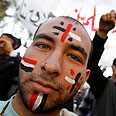
Poll: Over half of Egypt wants end to Israel peace
Survey conducted by US-based research center shows 54% of Egyptians would like to see 1979 peace treaty scrapped
More than half of all Egyptians would like to see the 1979 peace treaty with Israel annulled, according to a poll conducted by the US-based Pew Research Center.
The results of the poll, released on Monday, highlight the deep unpopularity of the three-decade-old treaty, which is central to US policy in the region and was scrupulously adhered to by former President Hosni Mubarak, until his Feb. 11 ouster.
The poll also revealed that most Egyptians are optimistic about where the country is headed following the 18-day popular uprising that brought down the president, and they look forward to greater democracy in their country.
The fall of Egypt's autocratic leader and the rise of a more democratic system, however, could threaten relations with neighboring Israel.
According to the poll results, only 36% of Egyptians are in favor of maintaining the treaty, compared with 54% who would like to see it scrapped.
Despite the decades of peace and limited trade between the two countries, most Egyptian view the Israelis poorly, largely because of perceptions that they mistreat the Palestinians.
Opinions varied according to income, with 60% of lower income Egyptians supporting the treaty's cancellation while only 45% of the wealthier classes thinking it should be done away with.
Only 40% of Egyptians with a college education felt the treaty should be scrapped, as well.

Burning Israeli flag outside embassy in Cairo (Photo: AP)
The poll, based on interviews with 1,000 Egyptians around the country, was conducted between March 24 and April 7 as part of the Spring 2011 Pew Global Attitudes survey held in 22 countries.
The poll has a sampling error of plus or minus 4 percentage points.
The country's youth-led pro-democracy movement, which rocked Egypt and reworked the political environment, had a dramatic effect on people's attitudes. The polls show a major rise in optimism and changing of national priorities.
Egyptians spilt on next leader
In 2007, Egyptian were evenly split over which was more important, a strong leader or democracy, but in the recent poll 64% rated democracy higher.
Egyptians remained quite split on just who they wanted to lead them as new political forces emerge after the decades of repression. In September, elections will be held for a new parliament after the one overwhelmingly dominated by Mubarak's ruling party was dissolved.

Fighting for democracy (Photo: Reuters)
The conservative Islamist Muslim Brotherhood and the largely secular April 6 movement - two groups closely involved in the uprising, had the highest approval ratings in society, with over 70% seeing them in a very or somewhat favorable light.
People also overwhelmingly approved of the army, which forced out Mubarak and is currently in the control of the country.
Of those whose names have been put forward as possible candidates for the upcoming November presidential elections, former Arab League head Amr Moussa was the most popular, with 89% giving him a very or somewhat favorable rating.
Former presidential candidate Ayman Nour trailed with a 70% rating while Nobel Prize Laureate and reform leader Mohamed ElBaradei only had 57% rating.
The United States continued to garner low approval ratings, with only 20% of Egyptians seeing it in a positive light, up from 17% in 2010.
Only 15% of those interviewed thought Egypt should have closer relations with the US - as opposed to 43% who though the two countries could use some distance.
- Follow Ynetnews on Facebook










